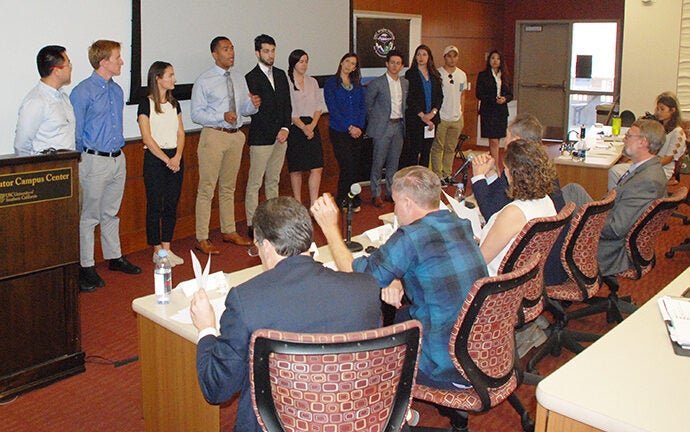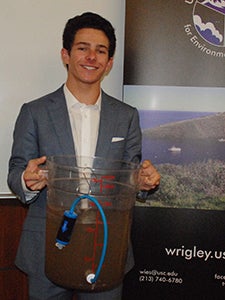
Students compete for inaugural USC Wrigley Sustainability Prize
Undergraduate Kevin Kassel lugged a heavy plastic water canister containing gallons of murky water to the front of the lecture hall, then held up a beaker and turned the spigot. Astonishingly, out flowed a stream of remarkably clean-looking water. Kassel took a sip and smiled, then filled several cups and handed them to the panel of judges sitting before him who sipped gingerly before nodding their approval.
One of seven finalists in the inaugural Wrigley Sustainability Prize, Kassel, a senior majoring in environmental studies at USC Dornsife and business at USC Marshall School of Business, was demonstrating Aqusafe, an affordable water filter he developed to tackle the world’s lack of access to clean water.
Kassel was presenting his pitch before judges and students gathered at Ronald Tutor Campus Center at USC on April 21. The finalists were competing for $15,000 in prize money and a free trip to the USC Wrigley Marine Science Center on California’s Santa Catalina Island.
Building on the institute’s environmental mission, the entrepreneurial competition — which will be held annually — is designed to support environmental ideas with market potential that come from within the USC community. USC undergraduate or graduate students, faculty, staff and recent alumni were all invited to compete, the only caveat being that each team must include one current USC student.
“The competition was designed to help the USC community work together to turn their ideas into action—to highlight innovative start-up ideas from all disciplines, rewarding concepts that could result in meaningful environmental change,” said Ann Close, assistant director of the USC Wrigley Institute for Environmental Studies.
Selected from 46 entries, finalists made their five-minute pitches to a panel of distinguished judges that included Amber D. Miller, dean of USC Dornsife; John Heidelberg, associate professor of biological sciences; David Belasco, co-director of the Lloyd Greif Center for Entrepreneurial Studies; Todd Bauer, founder and president of Guardian Group Inc.; and J. R. Johnson, founder of Trippy.com and VirtualTourist.com.

Kevin Kassel demonstrates his Aqusafe water filter that aims to save lives and create social entrepreneurs by providing access to clean water.
In evaluating each project, judges considered how innovative it was, its potential environmental or sustainability impact and its feasibility, asking “can the idea be executed and would it have commercial appeal?”
Social entrepreneurship
Kassel told the judges he was inspired to develop his water filtration device after a high school trip to Ecuador where he delivered a water filter to an elementary school. That became a life-changing event when he learned a 7-year-old girl had died the previous week from diarrhea caused by lack of access to clean water.
“I was shocked,” he said. “We don’t think of diarrhea as fatal, and the fact that the solution was so simple and inexpensive — a $60 water filter — made me think, ‘Maybe if we had been there a week earlier, that little girl might still be alive.’”
Learning that more than 3 billion people worldwide rely on expensive, outdated and polluting treatments to make their water safe to drink inspired Kassel to start the student nonprofit, Club H2O, to distribute water filters around the world.
“Today we’ve provided 10,000 people with access to clean water in over 32 different countries,” he said.
Kassel’s global business spin-off from that charity — Aqus — designs, manufacture and sells simple water filters to people in developing countries who currently rely on boiling water or buying bottled water.
“For poorer customers, Aqusafe filters have the capacity to filter enough water daily to allow them to become water entrepreneurs and generate a supplemental income by providing a lifesaving service to their community,” he said. “It’s an example of what social entrepreneurship can achieve.”
Winning ideas
The top prize went to USC Marshall student Jenny Liu and Noah Snyder who won $7,000 for Interphase — a heat retentive, nontoxic, anti-biofouling coating for power plant piping that increases efficiency and that has many other applications. Their innovation will soon be tested at the USC Wrigley Marine Science Center on Catalina.
Kyle Borch and Camille Conner of USC Viterbi and Willie Du of USC Marshall won the second prize of $5,000 for their project ReFlo, a monitor for tracking shower use in real time that has inbuilt gamification to encourage users to reduce water use. Holly Tassi of USC Marshall took the $3,000 third prize for her project titled “Believe in Bambara,” which aims to create an American market for non-dairy milk made from the bambara ground nut harvested by women in Ghana.
Other finalists and their projects are listed on the contest website.
Program assistant Chase Puentes said the competition addresses a pivotal problem with sustainability: Those who want to better the environment typically don’t have entrepreneurial experience, and business students tend to focus on making money rather than reducing our impact on the planet.
“The goal of the Wrigley Sustainability Prize is to take students from different academic disciplines with sustainable ideas and provide them with basic business training so they can successfully implement their concepts to produce innovate and profitable solutions,” she said.
Although he didn’t place in the top three, Kassel said he found the experience to be immensely valuable.
“Getting feedback on the way we communicate it is almost as important as feedback on the idea because that influences the way that we talk about our business to potential hirers, to partners, to customers,” he said. “For me, having the opportunity to be a part of and grow from these types of competitions while at USC has been huge.”